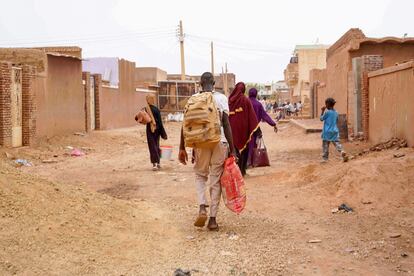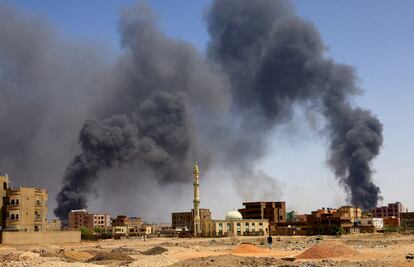Sudan war: Aid groups express concern over large number of missing people in Khartoum
Since fighting broke out between the army and RSF paramilitaries in April, some 200 disappearances have been registered in the capital alone amid reports of targeted arrests and torture in detention centers

In the selfie, Arwal appears with a shy smile, a brightly colored shirt and his braided hair pulled back, posing next to a little boy with a soda in his hands. The image was posted Sunday night by his brother, Angelo, on a public Facebook group. It was accompanied by a brief description and a direct request: “Arwal has been missing since war broke out in Sudan between the army and the paramilitary Rapid Support Forces (RSF) in mid-April in the country’s capital, Khartoum, so any information that can be provided about him would at least be a lead to follow to try and find him.”
Two days earlier, one of the group’s administrators highlighted the case of another young man named Muhammad Abdulrahim, who was arrested by RSF paramilitaries last week as he was returning home after accompanying a group of wounded neighbors out of Khartoum to seek treatment at a hospital. Those close to him still know nothing of his whereabouts.
As the weeks go by and the fighting in Sudan continues with no sign of letting up, the tragedy not only of the hundreds of dead, thousands of wounded, and hundreds of thousands of displaced, but also of those who have gone missing, is becoming more and more evident. The situation has been exacerbated by the absence of the government and by the insecurity that reigns in the areas where the fighting is concentrated, such as Khartoum and the Darfur region, where paramilitaries have been deployed in force and are spreading terror.
Since April 15, when fighting broke out between the Sudanese Army and the RSF, through May 20, 229 cases of missing persons have been documented, according to a tally made by a local online initiative dedicated to helping find people who are unaccounted for. Most of the missing are men aged 20 to 35, and about 15 are minors. Only 35 have returned to their families after going missing, while six others have been found dead.
The vast majority of the disappearances have taken place in Khartoum: some 200 of those people who have gone missing were last seen in the capital. In many cases they vanished after being arrested or running into RSF paramilitaries, who control much of the city and have formed strongholds in many residential areas and buildings.
Due to the chaos into which the Khartoum area has been plunged, the Missing Initiative has warned that it is very difficult to keep track of the actual number of people affected. As with the death toll from the fighting, which now stands at more than 700, it is feared that the real number is much higher than those that have been documented. Civil society campaigns such as the Missing Initiative also have limited resources, but it is primarily these types of organizations that are filling the gaps left by state agencies.
In the case of missing persons, a key means of organization is social networks, to which families and friends are turning for information about their loved ones. The number of cases is becoming so high that the International Committee of the Red Cross has also decided to provide a telephone number where help can be sought.
The Rapid Support Forces have an intentionally weak chain of command, operate with great autonomy, are very experienced in urban battles and have a long history of human rights violations. In recent weeks, multiple accounts of RSF fighters raiding houses and carrying out targeted arrests have also been emerging.

RSF detention centers
A former member of the Islamist National Congress Party of former dictator Omar al-Bashir, who was deposed in a 2019 coup and with whom the paramilitaries are openly at odds, stated on his Facebook profile on Sunday that he was arrested and tortured in mid-May and held in a secret RSF detention center with between 200 and 300 others. Although the Sudanese Army does not have much of a presence in the capital, there have also been reports of civilian detentions on its part since the start of the war.
In addition to those who have disappeared into detention centers, there are many who have died without their bodies being recovered or identified. Organizations such as the Missing Initiative and the Sudanese Red Crescent have reported large numbers of unidentified bodies in the streets of Khartoum, in the hospitals that are still operational, in morgues and buried in graves.
Although the number of missing persons has accelerated rapidly since the outbreak of fighting in April, the Sudanese civilian population has been grappling with this crisis for years. During the violent eviction of an encampment set up in Khartoum in June 2019 to demand a civilian government after the two now warring parties seized power in a coup d’état, dozens of people went missing and their fate has never been clarified. Similarly, after the coup that the army and RSF paramilitaries jointly carried out at the end of 2021 to put an end to the democratic transition launched two years earlier, numerous disappearances were documented, especially after protests were held.
Sign up for our weekly newsletter to get more English-language news coverage from EL PAÍS USA Edition
Tu suscripción se está usando en otro dispositivo
¿Quieres añadir otro usuario a tu suscripción?
Si continúas leyendo en este dispositivo, no se podrá leer en el otro.
FlechaTu suscripción se está usando en otro dispositivo y solo puedes acceder a EL PAÍS desde un dispositivo a la vez.
Si quieres compartir tu cuenta, cambia tu suscripción a la modalidad Premium, así podrás añadir otro usuario. Cada uno accederá con su propia cuenta de email, lo que os permitirá personalizar vuestra experiencia en EL PAÍS.
¿Tienes una suscripción de empresa? Accede aquí para contratar más cuentas.
En el caso de no saber quién está usando tu cuenta, te recomendamos cambiar tu contraseña aquí.
Si decides continuar compartiendo tu cuenta, este mensaje se mostrará en tu dispositivo y en el de la otra persona que está usando tu cuenta de forma indefinida, afectando a tu experiencia de lectura. Puedes consultar aquí los términos y condiciones de la suscripción digital.









































